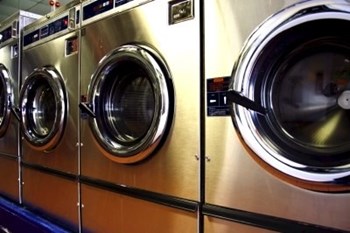
Having a well-lit, well-maintained laundry room in one's building is a definite plus. Residents don't have to traipse out to the overcrowded Laundromat in the dead of winter or in the pouring rain to spend hours waiting for machines when the facilities are right in their own building. Residents depend on their building's facility to be clean, modern and in good working order. The building's board and management company will expect that the laundry vendor will provide new machines, good service, updated technology—bye-bye coins, hello smart card!—and regular maintenance.
Taking Care of Business
"In most instances, we provide the equipment, carry the insurance, conduct repairs and pay the building a rental fee for the use of the facility," explains Denise Savino-Erichsen, vice-president of Automatic Industries in Hempstead, New Jersey. "We'll also include amenities and room furnishings such as tables, chairs, carts and so forth."
There is no initial outlay for most buildings when creating their laundry room—and again for most buildings, laundry rooms are moneymakers.
"They get their money based on the revenue stream of the building," says Ron Garfunkel, president of Service Directions Inc. in Yonkers. "There is no cookie-cutter approach as to how that's figured out. It can be a flat fee or a percentage. If we've been in buildings for a long time, we will know what the income stream is and we may pay them flat rents. We like to pay percentages, because if the volume goes up they lose out if they don't get paid by percentage."
A Plan for Everybody
According to Steve Breitman, president of SEBCO Laundry Systems in Green Brook, New Jersey, there are three common types of agreements: the laundry lease agreement; license agreement; and the management agreement.
"The most popular and widely used is the laundry lease agreement," says Breitman. "It creates a basic relationship between the property and the laundry company. Typically leases are five to 10 years in length and the term is most driven by two factors: the equipment cost and the return that the laundry company can expect from the collections. Additionally, if there is fix-up included with the agreement—painting, lighting, tile floor or other amenities—the term tends to be to the longer side."
Breitman goes on to explain that the license agreement provides similar terms to a lease agreement, but he says that in some instances laundry companies do not want to enter into license agreements because it may not afford them adequate security.
"A management agreement has limited application and is primarily used when a building is subject to the 80/20 tax law," says Breitman. "The revenue is directed to the property and the board receives payment from the manager. There are a number of variations to this type of agreement to fit the specific needs of the property."
So what kind of agreement suits your building's needs? All experts interviewed for this article agree that you need a specific agreement written for the needs of your building, not a boilerplate agreement.
A Word of Advice
Before signing on any dotted line, however, heed the advice of Michael Arbus, regional sales manager, Mac-Gray Laundry Services in Hoboken.
"More or less every part of the contract is negotiable although there are some standard clauses," he says. "Beware of hidden clauses though and read—or have the building attorney read—the fine print."
Garfunkel sums it up well: "What the big print giveth, the small print taketh away. Some companies use boilerplate agreements with evergreen clauses, automatic extensions and the 'right of first refusal,' and these agreements have plagued the industry."
Right of first refusal gives the building's current vendor the right to match any bid that a prospective vendor has provided to the building when it comes time for renegotiation. The building is then 'locked-in' to using the current vendor again.
On November, 13, 2005, The New York Times reported on a State Appeals court decision in Manhattan that invalidated the "right of first refusal" clause in these laundry room contracts when one company failed to remove its machines and vacate the premises when the co-op decided not to renew its lease.
According to the article, "The appellate court noted that 'such a temporally unrestricted right would constitute an unreasonable restraint' on the co-op's ability to do what it wanted with its property."
Without reading contracts closely, many buildings get caught in this legal loophole and do not have the resources to litigate their way out of it. So, it's important to say it again—read your contract.
Time for Renegotiating
When the contract is up and it's time for renegotiation, Breitman says there are three main reasons that properties elect to renegotiate agreements: money; modernization and updated equipment; and beautification.
According to Breitman, "Today's most requested features are card systems that allow the residents to use a laundry card as opposed to coins."
Arbus explains that laundry companies such as his will often approach the building's management to discuss renegotiation up to a year before the contract is close to expiring. "We want to keep the building from going out to bid, so if it's an eight-year contract, we'll go in year seven and talk with them."
He says that during this renegotiation process, management should be very concerned with being provided with all new equipment and watch out for companies who attempt to switch to refurbished equipment.
According to Edward Kwitko, vice president of Hercules Corporation in Hicksvile, buildings looking to renegotiate their contracts should know what their residents want, and be ready to communicate their needs clearly. "I think the most important thing is to tell me what they want," says Kwitko. "And I'm not talking money now —I'm talking in terms of equipment, amenities... things of that nature. That's critical for me, because at the end of the day that's the critical thing for the building. If they can provide me with information about what they want, I can deliver that, or perhaps suggest alternatives based upon their demographics and my own experience with the building."
Savino-Erichsen says when she started in the industry, the bottom line was a big factor in negotiation and renegotiation, but today, she sees that getting good service is just as, if not more, important to the management company.
"In this industry, there have been many acquisitions and a few buildings have been burned with their company and one of the first things they ask now is for references so they can check their service," says Savino-Erichsen.
Not all renegotiation leads to a resigning of the contract. Perhaps the new rates are too low for the building or too high for the vendor, or perhaps the building was not satisfied with the service they received from the vendor. As with any separation or dissolution of business, who owns what?
Remember the movie The Money Pit with Tom Hanks and Shelley Long? In that flick, Hanks and Long buy a beautifully decorated house, only to find out that when the previous owners moved out, they took everything they felt they owned—right down to the doors and door knobs! Thankfully in the laundry industry, things work a little differently and the previous vendor will not leave with the sinks and plumbing.
"As a rule, the plumbing belongs to the building and the only thing we would remove is the machinery," says Savino-Erichsen. "We leave it swept, clean and ready for the next vendor. In most instances, nobody likes to lose business, so you leave tactfully because what goes around comes around. Sometimes the decision is ours to leave and it's not cost effective for us to stay."
If the management company will be signing with a new vendor, Garfunkel says, "Do not accept the bid without seeing the accompanying agreement because the proposal could say one thing, and the agreement can change that."
Maintaining a laundry room that is safe, operational and comfortable, generates revenue and makes the residents happy is what owners and managers want. If you don't give them that, you'll be all washed up.
Lisa Iannucci is a freelance writer, published author and mother of three living in Poughkeepsie, New York.






Leave a Comment